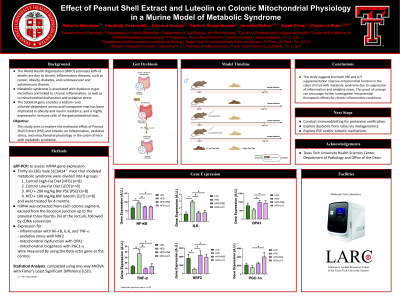Monday Poster Session
Category: Colon
P1913 - Effect of Peanut Shell Extract and Luteolin on Colonic Mitochondrial Physiology in a Murine Model of Metabolic Syndrome
Monday, October 28, 2024
10:30 AM - 4:00 PM ET
Location: Exhibit Hall E

Has Audio

Roberto Mendóza, BS
Texas Tech University Health Sciences Center
Lubbock, TX
Presenting Author(s)
Roberto Mendóza, BS1, Hemalata Deshmukh, PhD1, Julianna Santos, PhD2, Sathish Sivaprakasam, PhD1, Jannette Dufour, PhD1, Zarek Driver, BS3, Chwan-Li Shen, PhD1
1Texas Tech University Health Sciences Center, Lubbock, TX; 2Texas Tech University Health Sciences Center, El Paso, TX; 3Texas Tech University, Lubbock, TX
Introduction: Metabolic syndrome and its chronic inflammatory sequelae are an insidiously progressive public health concern. The World Health Organization (WHO) estimates 60% of deaths are due to chronic inflammatory diseases such as cancer, obesity, diabetes, and cardiovascular and autoimmune disease. In the United States, the prevalence of disease associated with chronic inflammation are anticipated to increase persistently for the next 30 years. Metabolic syndrome is associated with dysbiosis in gut microflora and has been linked to chronic inflammation, as well as mitochondrial dysfunction and oxidative stress. Peanut shell extract (PSE), and notably its bioactive flavonoid luteolin, have demonstrated anti-inflammatory and antioxidant pharmacological properties; however, their effect on the colon remains unclear.
Methods: Therefore, this study aimed to explore the molecular effect of PSE and luteolin on inflammation, oxidative stress, and mitochondrial physiology in the colon of mice with metabolic syndrome. Thirty-six male SLC6A14-/- mice that modeled metabolic syndrome were divided into 4 groups: Control High-Fat Diet [HFD] (n=9), Control Low-Fat Diet [LFD] (n=9), HFD + 200 mg/kg BW PSE [PSE] (n=9), and HFD + 100 mg/kg BW luteolin [LUT] (n=9) and were treated for 4 months. After tissue collection, colonic RNA was extracted followed by cDNA conversion for qRT-PCR. Gene expression was measured for inflammation via NF-κB, IL6, and TNF-⍺; oxidative stress via NRF2; mitochondrial dysfunction via OPA1; and, mitochondrial biogenesis via PGC-1⍺.
Results: Compared to the LFD group, the HFD group had significantly increased expression of NF-κB (p=0.0002), IL6 (p=0.0005), and TNF-⍺ (p=0.0015); and, significantly decreased expression of NRF2 (p=0.0276). Meanwhile, PSE- and LUT-supplemented groups in comparison to the HFD group demonstrated significantly lower expression of NF-κB (PSE, p=0.0019; LUT, p=0.0017), IL6 (PSE, p=0.0013; LUT, p=0.0011), and TNF-⍺ (PSE, p=0.0003; LUT, p=0.0015); and, significantly higher expression of NRF2 (PSE, p=0.0065; LUT, p=0.0221) and OPA1 (PSE, p=0.0239; LUT, p=0.0380). In addition, relative to the HFD group, LUT-supplemented group had significantly higher PGC-1⍺ (p=0.0074).
Discussion: This study suggests that both PSE and LUT supplementation improve mitochondrial function in the colon of mice with metabolic syndrome due to the suppression of inflammation and oxidative stress.
Disclosures:
Roberto Mendóza, BS1, Hemalata Deshmukh, PhD1, Julianna Santos, PhD2, Sathish Sivaprakasam, PhD1, Jannette Dufour, PhD1, Zarek Driver, BS3, Chwan-Li Shen, PhD1. P1913 - Effect of Peanut Shell Extract and Luteolin on Colonic Mitochondrial Physiology in a Murine Model of Metabolic Syndrome, ACG 2024 Annual Scientific Meeting Abstracts. Philadelphia, PA: American College of Gastroenterology.
1Texas Tech University Health Sciences Center, Lubbock, TX; 2Texas Tech University Health Sciences Center, El Paso, TX; 3Texas Tech University, Lubbock, TX
Introduction: Metabolic syndrome and its chronic inflammatory sequelae are an insidiously progressive public health concern. The World Health Organization (WHO) estimates 60% of deaths are due to chronic inflammatory diseases such as cancer, obesity, diabetes, and cardiovascular and autoimmune disease. In the United States, the prevalence of disease associated with chronic inflammation are anticipated to increase persistently for the next 30 years. Metabolic syndrome is associated with dysbiosis in gut microflora and has been linked to chronic inflammation, as well as mitochondrial dysfunction and oxidative stress. Peanut shell extract (PSE), and notably its bioactive flavonoid luteolin, have demonstrated anti-inflammatory and antioxidant pharmacological properties; however, their effect on the colon remains unclear.
Methods: Therefore, this study aimed to explore the molecular effect of PSE and luteolin on inflammation, oxidative stress, and mitochondrial physiology in the colon of mice with metabolic syndrome. Thirty-six male SLC6A14-/- mice that modeled metabolic syndrome were divided into 4 groups: Control High-Fat Diet [HFD] (n=9), Control Low-Fat Diet [LFD] (n=9), HFD + 200 mg/kg BW PSE [PSE] (n=9), and HFD + 100 mg/kg BW luteolin [LUT] (n=9) and were treated for 4 months. After tissue collection, colonic RNA was extracted followed by cDNA conversion for qRT-PCR. Gene expression was measured for inflammation via NF-κB, IL6, and TNF-⍺; oxidative stress via NRF2; mitochondrial dysfunction via OPA1; and, mitochondrial biogenesis via PGC-1⍺.
Results: Compared to the LFD group, the HFD group had significantly increased expression of NF-κB (p=0.0002), IL6 (p=0.0005), and TNF-⍺ (p=0.0015); and, significantly decreased expression of NRF2 (p=0.0276). Meanwhile, PSE- and LUT-supplemented groups in comparison to the HFD group demonstrated significantly lower expression of NF-κB (PSE, p=0.0019; LUT, p=0.0017), IL6 (PSE, p=0.0013; LUT, p=0.0011), and TNF-⍺ (PSE, p=0.0003; LUT, p=0.0015); and, significantly higher expression of NRF2 (PSE, p=0.0065; LUT, p=0.0221) and OPA1 (PSE, p=0.0239; LUT, p=0.0380). In addition, relative to the HFD group, LUT-supplemented group had significantly higher PGC-1⍺ (p=0.0074).
Discussion: This study suggests that both PSE and LUT supplementation improve mitochondrial function in the colon of mice with metabolic syndrome due to the suppression of inflammation and oxidative stress.
Disclosures:
Roberto Mendóza indicated no relevant financial relationships.
Hemalata Deshmukh indicated no relevant financial relationships.
Julianna Santos indicated no relevant financial relationships.
Sathish Sivaprakasam indicated no relevant financial relationships.
Jannette Dufour indicated no relevant financial relationships.
Zarek Driver indicated no relevant financial relationships.
Chwan-Li Shen indicated no relevant financial relationships.
Roberto Mendóza, BS1, Hemalata Deshmukh, PhD1, Julianna Santos, PhD2, Sathish Sivaprakasam, PhD1, Jannette Dufour, PhD1, Zarek Driver, BS3, Chwan-Li Shen, PhD1. P1913 - Effect of Peanut Shell Extract and Luteolin on Colonic Mitochondrial Physiology in a Murine Model of Metabolic Syndrome, ACG 2024 Annual Scientific Meeting Abstracts. Philadelphia, PA: American College of Gastroenterology.

